While the summer slowly creeps to a close, I’ve been slowly creeping my way through a handful of games, as one does when they don't have much of a social life and a fairly large backlog of video games to look at. I could tell you about how I think Dead Cells is pretty good even though I’m sick to death of “run-based games with a similar permanent death structure to the old computer game Rogue and its contemporaries.” That might be something I touch upon near the end of the year, depending on how I feel about it after some more time, so instead how about I talk about the games everyone else isn’t already showering praise upon?
SWAT 4
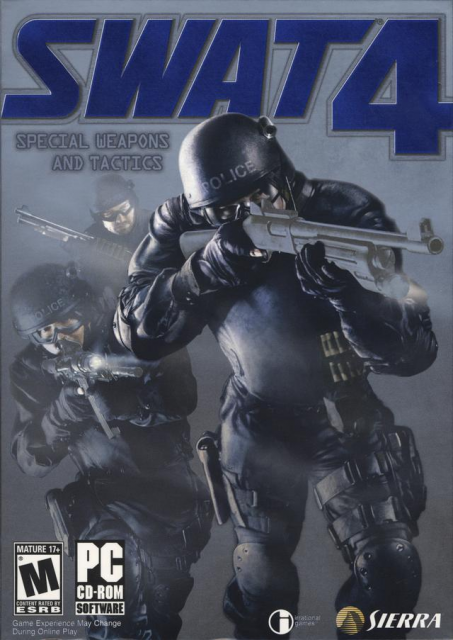
There’s something really strange and slightly hilarious about SWAT 4 being the direct descendant of Police Quest: SWAT, the game responsible for the infamous “slice the pie” moment during one of Vinny and Dave’s old game streams. (Seriously, if you’re a newer premium subscriber and haven’t watched that video, do so immediately. I’ll wait.) I’m not quite sure how SWAT went from being the worst kind of mid-90s FMV adventure game to a tense squad shooter developed by a pre-Bioshock Irrational Games, but I guess if nothing else there’s still a shared obsession with police procedure and “authenticity.” Regardless of how it happened (I guess SWAT 2 is like… a real-time tactics game where you fight a drug cult?) I found myself surprisingly way into SWAT 4’s brand of slightly pedantic, somewhat punishing squad shooting, to the point where I played the entire game and its expansion with a damn mouse and keyboard despite the whole “chronic repetitive stress injury” thing I have going on with my right arm.
It’s fair to say that one of the biggest reasons SWAT 4 appealed to me in the first place is that I haven’t really played anything else like it. The brief heyday of serious tactical shooters was certainly one that passed me by, and for as many sneer quotes as I’ll throw around the word “authentic” I can’t think of many other shooters that force the player into clearly defined rules of engagement and procedure as strictly and emphatically as SWAT. You can't shoot a suspect with a lethal weapon until they aim their weapon at a police officer or hostage, and there's a button semi-dedicated to yelling at people to get on the ground, which I find hilarious but is also a required part of the procedure. That style of high-lethality tactical shooting alongside a scoring system that emphasizes non-lethal engagement and police busywork (zip-tying everyone, collecting loose weapons, reporting status to the TOC) creates a very unique sort of experience, in which moments of careful planning, scouting, and containment are punctuated with instances of violence and chaos as my (bad) plans inevitably went to hell with spectacular and disastrous results. Also, you can subdue people by tasing them or shooting a bunch of pepper spray in their face, which I will fully admit to enjoying more than is possibly healthy or respectable.
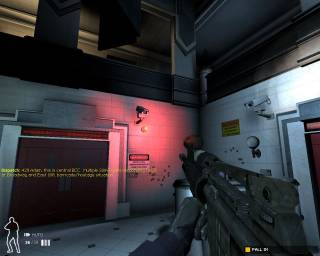
The other thing that stands out for me are the environments these missions take place in. There’s a certain dedication to mundane realism to SWAT 4’s level design that I really appreciate, including a lot of very good fake advertisements and businesses to look at while you’re clearing out buildings one room at a time. Even when you’re clearing out a tenement occupied by an apocalyptic cult, complete with some Bioshock-ass obvious graffiti on the wall* the layout of the rooms in the building itself feels plausible in a way that reminds me Irrational made this game. A self-contained building or series of buildings in each level admittedly isn’t as ambitious or cohesive as something like Rapture (or, more recently, Talos 1) but they exhibit an attention to immersion and detail that betrays the Looking Glass roots of the development studio.
It’s worth mentioning that, for as much as I will sing its praises and was able to see both the base game and expansion to credits, I am pretty bad at SWAT 4. When we talk about the demise of these sorts of hardcore tactical shooters, a phrase that will often get bandied around is “trial-and-error.” It’s not an entirely invalid criticism in any sort of game where one mistake at the wrong time can mean instant death, but I also have an affinity for weird old stealth bullshit and Dark Souls, which I think means I have a higher-than-average tolerance for that stuff. The AI of the squadmates is generally pretty good, but there are sometimes instances where they’ll throw a grenade at a weird angle, or get shotgunned in the face because something about the situation wasn’t checking the boxes for their rules of engagement. More often than not, however, I think the game is well-designed enough that my failings were often my own stupid fault, because I wasn’t patient, didn’t give great orders to the squad, or straight-up missed an important shot. I’d like to think I figured stuff out over the course of my playthrough (hey, you should probably maybe definitely consider wedging doors shut so people can’t get around you) but I managed to slop my way through on Normal difficulty surprisingly well, sometimes accidentally shooting people when I wasn’t supposed to, or watching as my AI squadmates all bit the dust. I can’t imagine getting anywhere on Impossible (where the required score to pass is 95/100) but the original Rainbow Six this is not. I played like half an hour of that thing out of curiosity and I think it might be a tad too old and intentionally inaccessible for me to want to put any more time into it.
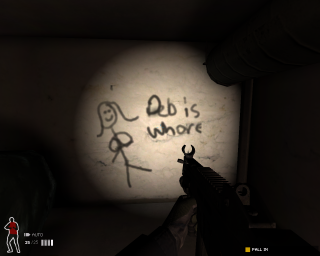
By contrast, I think anyone interested should give SWAT 4 a shot. While I don’t have a ton of interest in the entirely unsurprising “improved realism” mods or jumping through half a dozen hoops to play cooperative multiplayer, it’s one of the more novel and exciting things I’ve played this year (which is as much an indictment of how I feel about some of 2018’s hottest releases as it is a reflection of my own weird playing habits.) Honestly, it feels like I would’ve written a blog about this game 5 or 6 years ago if it was legally available back then, though that might just be the Looking Glass-adjacent nature of the whole thing.
*Just a little tangent, but I think “graffiti as environmental storytelling” is one of those things that I find super corny now. I’ll continue to accept, if sort of smirk at, convenient diaries and audiologs with door codes because video games aren’t made of infinite money, but for whatever reason I find the idea of some poor NPC writing ALL IS LOST in blood to be incredibly hokey and kind of hilarious.
Octopath Traveler
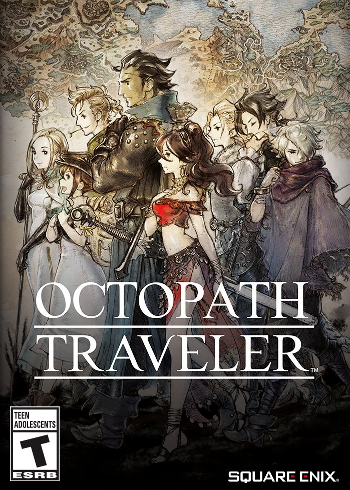
60+ hours and 8 completed stories later, I think it’s fair to say I enjoyed my time with Octopath Traveler. That’s probably not a surprise, given my preference toward mechanically dense RPGs is well-known, and there was a period in my life where I’d continually yell that Final Fantasy V was my favorite of the series. It’s why I found Bravely Default as frustrating as I did, because that game was halfway to being the modernized 16 bit RPG successor people wanted. If it had characters who weren’t obnoxious or one-note and didn’t give up around the 2/3rds mark, it probably would’ve been one of my favorite games of the last few years (Bravely Second kinda flew under my radar, and I never got around to playing it.) While I’m not entirely sure on the connection to the Bravely Default team, (I know there was some involvement from them on the Square-Enix side, but the bulk of actual development work was done by (some of) the people responsible for that vampire stripping game) but in a lot of ways Octopath Traveler feels like the modern FF V throwback that I wanted Bravely Default to be, though in other ways it’s… more complicated.
First off, if I haven’t made it evident already, I’m an absolute sucker for in-depth turn-based combat and flexible character building options. With the boost system resembling a less esoteric take on Bravely Default’s turn counting shenanigans, Shin Megami Tensei-esque weakness exploitation, and just a dash of class changing, it’s fair to say that the mechanics and combat in Octopath intersect with all of my Japanese RPG venn diagrams. I wouldn’t call it especially tough, at least if you know what you’re doing, but it’s involved enough that you can’t expect to randomly boost or attack and come out okay. The downside of that is sometimes even mundane random encounters can be a little on the long side, though I’m all for the boss fights being as long and demanding as they are.
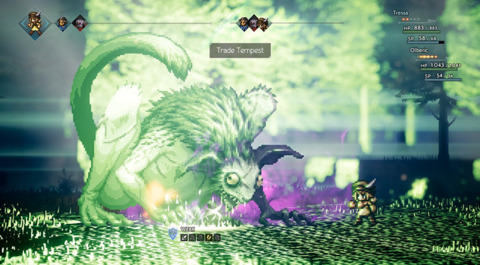
Even in the context of it being an intentionally old-school JRPG, Octopath is still a weird game to talk about. Beyond aforementioned turn-based combat, random encounters, etc, I think any given person’s enjoyment of it is almost entirely going to hinge around what they think of its unorthodox structure. While I know the concept of multiple separate stories in a JRPG isn’t a new thing (there are a surprising number of games with a similar idea, but most of them are Japan-only Super Famicom releases) it’s certainly not common. As someone who is occasionally fatigued with the way a lot of RPGs, Western or Japanese, are plotted, I’m very much into the concept of telling a bunch of smaller, more personal stories with lower stakes than your average “save the world from an ancient evil” tale. In practice, I found Octopath’s eight stories to range wildly in quality. While I’d call the prose encompassing all of them to be well-written, or at least well-localized (i.e. tone and characterization are conveyed well, though someone got way too carried away with H’aanit’s Middle English) it’s all in service to earnest, simple stories. I’d say that worked for me half the time, but the other half of the time I was alternating between rolling my eyes at overdone, obvious cliches and tropes (the number of mustache twirling villains who literally go “WAHAHAHAHAHA” is too much) and making depressingly accurate predictions about how any given story was going to proceed. Tressa’s story might as well end with someone saying “The real treasures were the friends we made along the way!” and I think that just about killed me. It probably doesn’t help that I think her VA is trying a little too hard, though I’d say the general quality of the English voice acting is decent, if not outstanding.
I’m of two minds in regards to how Octopath Traveler splits up and structures those eight stories. On one hand, I respect the uncompromising vision of everything being entirely disconnected. One could theoretically play through all four chapters of a single character’s story without ever picking up anyone else. It would be tedious, grindy, and not at all fun, but like fighting Ganon immediately after getting off the plateau in Breath of the Wild, it’s possible. Alongside the way you can perform everyone’s “path action” on almost every NPC, it ties everything together in a systemic, sandbox-y way which fits with the whole diorama aesthetic they have going on.
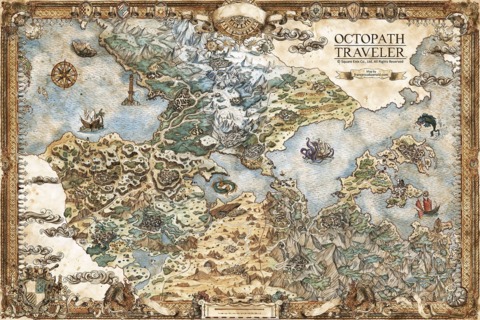
On the other hand… I kind of do wish they compromised the entirely open structure for the sake of a more interesting story. That would've led to a different game, with different design decisions along the way, but you know how practically everyone who’s played this game has complained about how little the main characters actually interact with each other? I also have that problem! While you do eventually get party banter once everyone’s chapter 2 starts to roll around, that could be a dozen hours into the game, which makes going through all of the chapter 1s a surreal, disconnected experience, especially if you play through multiple of them in one sitting. You need to do some weird party swapping shenanigans if you want to see all of them, and you don’t even start getting conversations with more than two characters until you finish someone’s chapter 4. The conversations themselves are usually charming, and come off like more contextual Fire Emblem supports or Tales skits, but I wouldn’t say any of them are revelatory.
How much that bothers you is going to be a very subjective thing, though for my part it was hardly a deal breaker. For all my talk of involved combat and inconsistent story quality, I think one of my favorite things about Octopath Traveler is how chill it is. I don’t see the repetitive nature of each chapter (around 15 minutes of story, basic dungeon crawl, boss, story, repeat) as a downside, and it works well in short bursts or marathon sessions with as much exploration and side quests as you want in-between. Despite claims to the contrary, I got enough experience just fighting most of the battles I came across and didn’t need to grind all that much outside of specific optional boss fights and the post-game. It doesn’t hurt that it’s really pretty to look at, and the soundtrack is easily my favorite of the year. I’m trying to drift away from saying “It isn’t for everyone” when I talk about anything encompassed by my eclectic weirdo tastes, because that should be self-evident. Instead, I’m going to say that Octopath Traveler actually worked really well for me in spite of quirks and problems others seem to take greater issue with. It’s pretty good! Maybe you should play it!
Random Endorsement
So, originally I was going to finish this blog last Friday but that endeavor was immediately flushed down the toilet by my discovery of various Doom source ports and mods, specifically Brutal Doom, a mod that indulges in the violent, gory, and stupid parts of the original games and amplifies them exponentially. I know it’s been floating around for a while, but I didn’t own Doom on PC until… like 3 days ago, and in the time since I started writing the Octopath Traveler section and the time I finished it, I beat all 4 episodes of Doom 1 in brutal fashion. I don’t know if I need to do the same for Doom 2 (I think I’d rather play that for the first time in a semi-unmodified capacity) but if you have the means and inclination, you should at least give Brutal Doom a look. It's worth at least 15 minutes for a laugh, while still being an entirely viable excuse to replay Doom again if you are willing to put in the time.
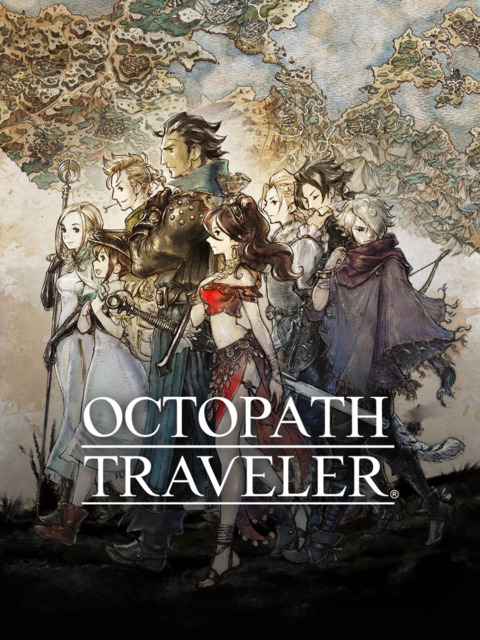
Log in to comment